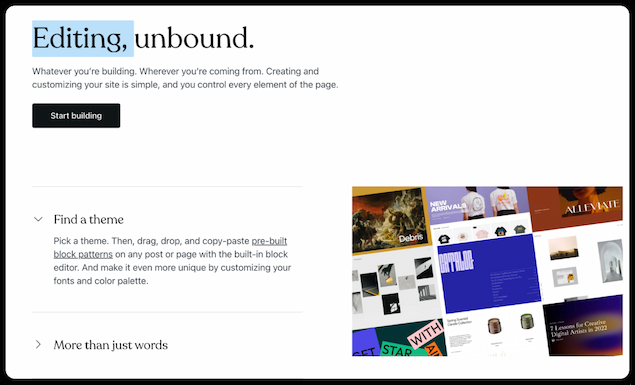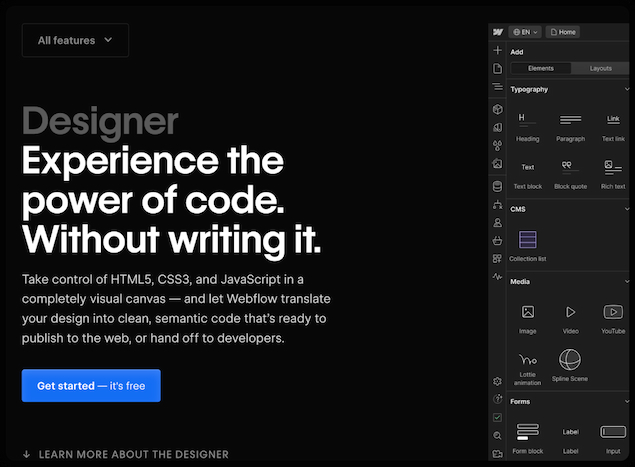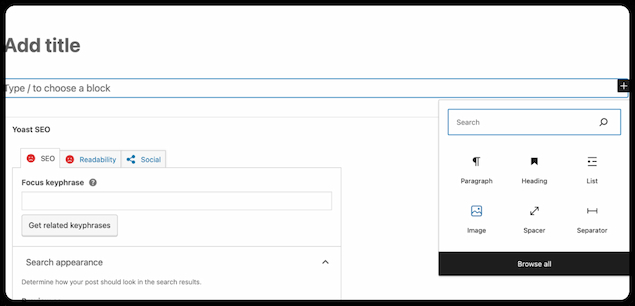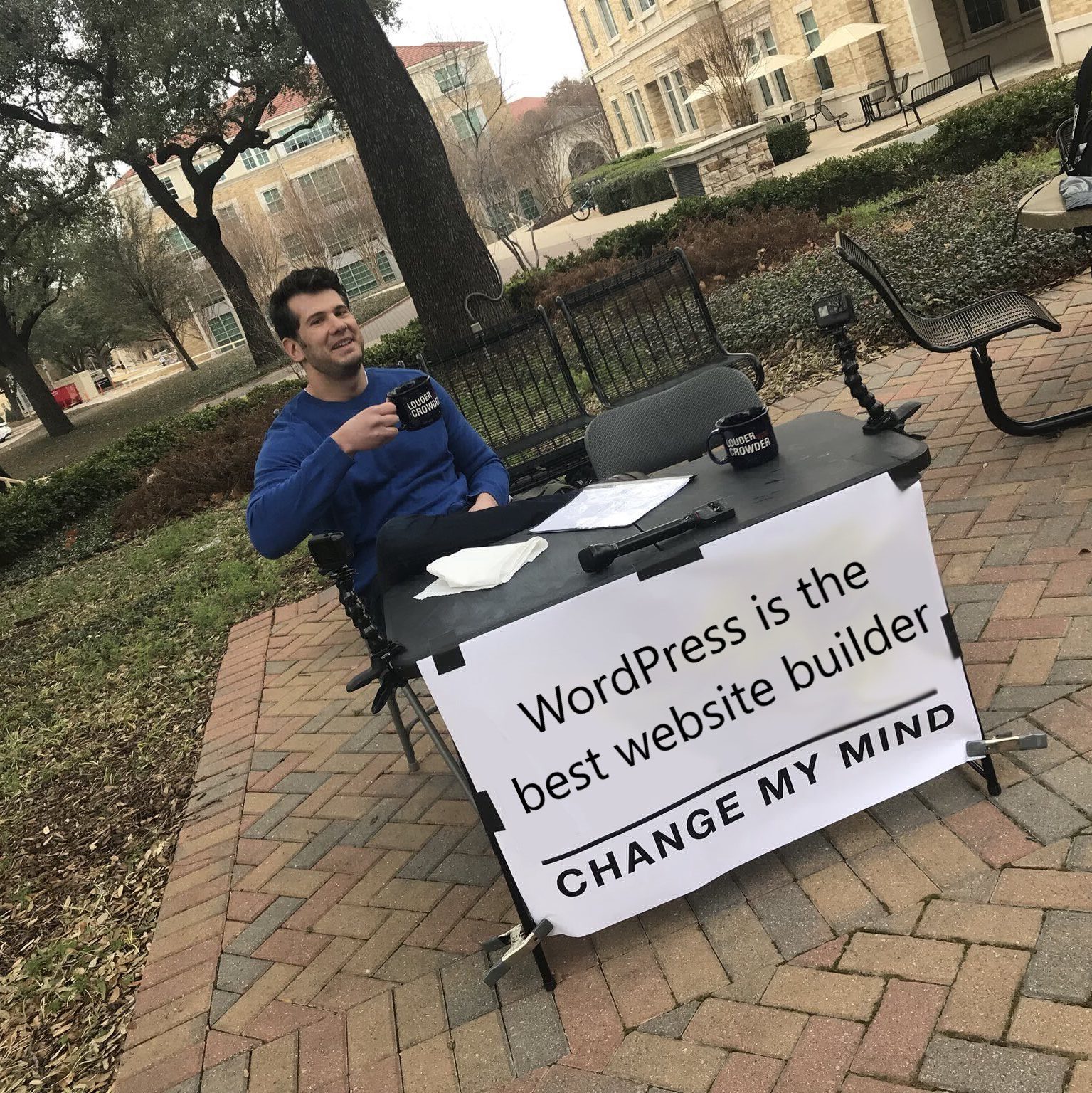There are countless website-building platforms, but this article will primarily focus on WordPress and Webflow. The best website builder for your business will depend on your specific needs and skills, as every business is unique.
39% of all websites on the Internet use WordPress. Although it is a familiar platform, some alternatives offer more extensive features or capabilities with varying levels of involvement or required knowledge.
Here’s what we’ll cover:
- Overview: WordPress vs Webflow
- Pros WordPress vs. Webflow
- Cons WordPress vs. Webflow
- Alternatives to WordPress and Webflow
A Few Questions to Consider
- What is the purpose of your site?
- How much time do you want to invest in building your website?
- How much design control do you want?
- How big will your site be?
- How flexible do you want to be with the host?
Choosing which website builder is best depends on what you value most, but definite differences should be addressed. WordPress fanboys will point to Webflow’s lack of an established marketplace for add-ons and plug-ins as a negative, but we see it differently. On a WordPress site, you need plugins to design your site, fix SEO, create forms, and add fancy animations.
Overview: WordPress vs Webflow
What is WordPress?

WordPress is an open-source website builder, so users can create websites without spending a penny. For this and many other reasons, WordPress is one of the most popular website-building tools and has been in business since 2003.
Although WordPress software is free, you must buy a domain name and web hosting to run it elsewhere. However, the process is relatively simple.
Feature Highlights of WordPress
Thanks to its customizable designs, WordPress has come a long way, allowing designers to build their websites from scratch. As a highly SEO-friendly website builder that integrates more than 54K plug-ins, this tool has consistently helped businesses rank highly. Websites built with WordPress are also mobile-friendly, and mobile apps that allow you to edit your website from anywhere. High performance and high security are also hallmarks of the leading website builder. In addition, WordPress websites offer extensive media management capabilities. Finally, WordPress is easy to use, and its longevity in the market has created a massive community of users who help each other with questions whenever they arise.
What is Webflow?

Webflow is the most popular no-coding website builder on the market. In addition to designing websites, it serves as a content management system and hosting platform.
Design professionals can easily create professional custom websites using the Webflow editor. By combining both approaches, the scope for design creativity knows no bounds. With these two features, you get the convenience of a visual editor and the freedom to create a unique website from scratch.
Feature Highlights of Webflow
Webflow lets you drag and drop elements to create pages, making it feel like a smartphone application. These drag-and-drop features are contained in an intuitive editor panel, much like Paint or Photoshop, so you may already understand how to use it.
Another advantage of Webflow is that it provides direct access to data from the CMS, so you do not have to use Google Tag Manager and Google Analytics to see who is visiting your site. This website builder uses sophisticated code that ensures fast loading. The complete platform integrates other marketing tools with data from forms and surveys and provides website backups to protect you from any website failures.
Pros: WordPress vs Webflow
Pros of WordPress

Free to Use and Affordable Set-Up
The cost of design, development, and maintenance is relatively low. With some technical understanding, managing and updating your website is easy. Because WordPress is self-hosted, you can install it with any hosting provider. WordPress is an attractive option if you are trying to get a website up and running quickly and do not want to spend a lot of money on domains and hosting.
Popularity
The name alone may also explain why many clients already have or want to use a WordPress site. Over the past 20 years, the platform has become synonymous with website creation. Unsurprisingly, more than one-third of all websites use WordPress due to its name recognition. Initially, WordPress was designed for blogging, and the platform provided all new websites with a a blog by default. But besides the standard blogging features, it also includes many advanced features like tags, plugins, widgets, and categories.
Countless Plug-Ins and Seamless Integrations
Plugins are a popular feature of WordPress. Plug-ins allow you to add features and functionality to your website. Do a quick Google search and you’ll find a plugin for almost anything you need. Need a website for your eCommerce business? Plugins are available for both. Just make sure you are using the latest version.
Pros of Webflow

No-Code Oriented but also Code-Friendly
With Webflow, building a website is no longer a two-step process because any changes you make, either with the drag-and-drop tools or with code, are presented to you instantly. Design and coding are no longer separate. This nifty website builder lets you design and develop your website with a single tool. Plus, you can preview your site before publishing it, so you can see exactly how it will look. Besides, a code editor is open to all savvy developers, so you can feel free to add your own code and design.
Uncomparable eCommerce Site Building
Unlike WordPress, Webflow does not require any additional integration to enable eCommerce settings on all pages of your sites, ensuring consistent customer checkout.
Responsive Page Designs & Modern Animations
Webflow allows you to create unique interactions and animations throughout your website. The room for creativity is immense, and some of the coolest and most cutting-edge animations, like scroll-based parallax, are a staple of these sites. Additionally, Webflow offers live data updates, so animations like progress bars can also be displayed with real-time updates.
Cons: WordPress vs Webflow
Cons of WordPress
Expertise
Although open-source software has many advantages, such as low cost and easy setup, there is always the possibility of running into a terrible bug that will break your website. It’s up to you to fix the technical issues unless you contact a WordPress developer; but otherwise, you’ll need a thorough knowledge of the platform to resolve these issues quickly. Moreover, WordPress is an easy blogging platform, but what about creating an online shop? Turning your WordPress website into an eCommerce platform using plugins like WooCommerce is possible. Still, it can be quite complex, especially if you do not have the expertise of a developer.
Loading Times
When you use a theme on WordPress, it tends to generate bloated code on the backend, which can cause your site to run slower, create errors, or crash altogether. These issues can lead to a higher bounce rate and a poor user experience, affecting how Google ranks your site in search. SEO increasingly depends on the on-site experience, so the cleaner the code, the better.
Updates
Updating WordPress or plugins may cause errors or temporarily affect your site. Since plugins add additional functionality, you must be aware of their updates. Since WordPress is a software, regular updates are also required. To avoid malfunctioning, you must keep an eye on both.
Cons of Webflow
Too Technical
One of Webflow’s greatest strengths is the ability of developers to design websites exactly the way they want. However, this, but that also means that non-developers cannot fully take advantage of this tool. It’s like using Thor’s Mjolnir to hammer in a nail; it does the job, but how necessary was it?
Cost
Moreover, the price of Webflow can be high for some WordPress users, ranging from 12 to 200 per month. Remember that WordPress is free, and the only real cost is hosting the site with a hosting service.
Support
Although there are plenty of community and chat groups, actual customer support directly from the Webflow team is lacking. There is no live chat or phone support, so talking to a Webflow developer when you get stuck on something may never happen.
Alternatives to WordPress and Webflow
Of course, there are many website builders out there, and some may serve your needs better than either Webflow or WordPress. Let’s look at some other options.
Easiest to use: Wix
Wix is easier to use than WordPress or Webflow, and many apps and add-ons are offered to add extra functionality to all of your desired sites.
Best Website Templates: Squarespace
Squarespace lacks the flexibility of Webflow, Wix, or WordPress but excels with its expertly designed-templates. This lack of flexibility is by design, as the website’s layout is predetermined by the template you choose.
If you’re looking for a clean, professional, and inviting design, but don’t need the layers of design power or freedom you get from other builders, then Squarespace might be the right choice.
Best for eCommerce: Shopify
If you are building a website for your eCommerce business, then creating a website with Shopify may be the way to go for you. With more than 70 easy-to-implement website templates, Shopify expert website builders, and all the tools you need to build a website how you want, Shopify offers the best of both worlds.
Shopify is undoubtedly the best provider for eCommerce on your website. It offers your domain, instant secure transactions, and high-speed servers, so you can rest assured that your website will always be up and running.
We love WordPress, so much that even this site is built on WordPress. This is how the NoGood team feels:

But if we were starting from the beginning today, we would definitely consider using Webflow instead. WordPress isn’t a bad option, it’s just that Webflow delivers cleaner code and makes even a novice webmaster look like a design pro.
Need help optimizing your website for SEO?




